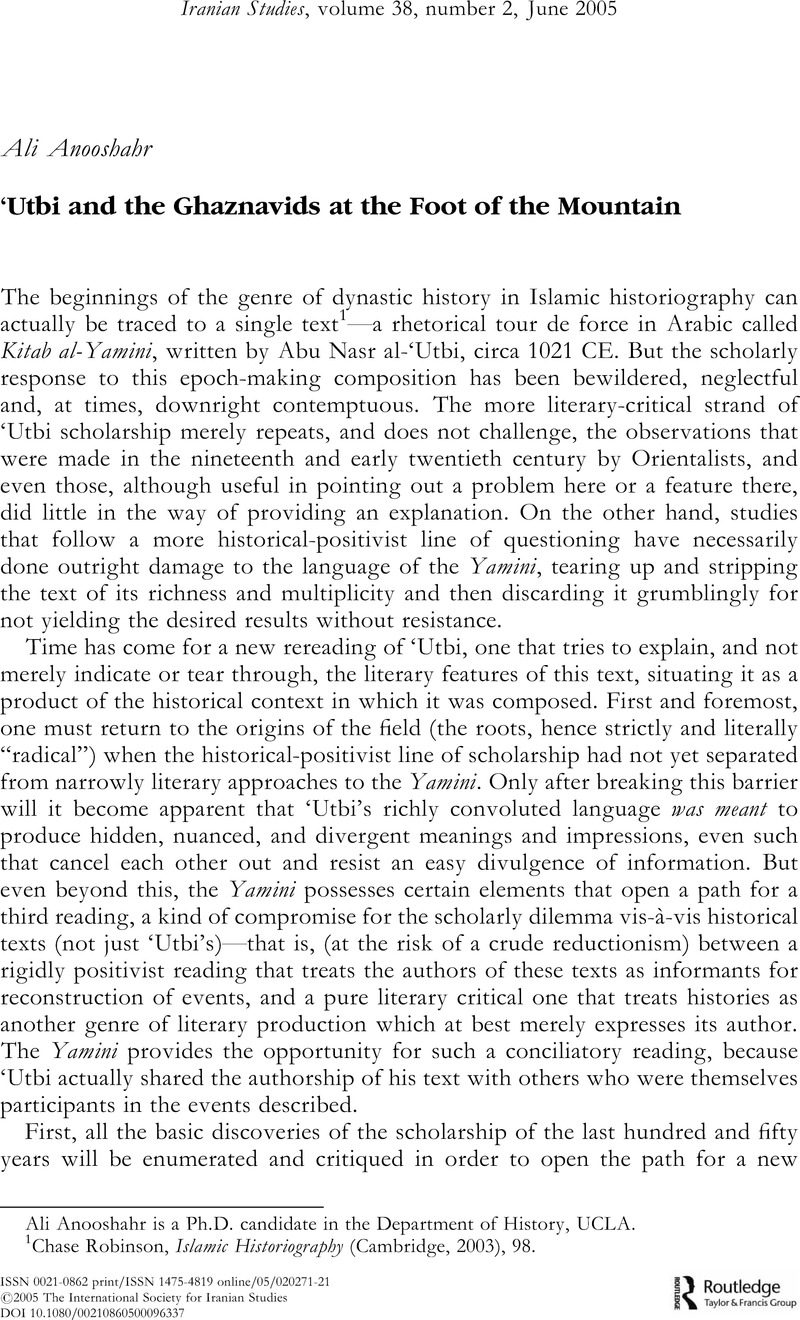Article contents
‘Utbi and the Ghaznavids at the Foot of the Mountain
Published online by Cambridge University Press: 01 January 2022
Abstract

- Type
- Articles
- Information
- Copyright
- Copyright © Association For Iranian Studies, Inc 2005
References
1 Robinson, Chase, Islamic Historiography (Cambridge, 2003), 98Google Scholar.
2 Nöldeke, Theodor, “Über das Kitab Jamini des Abu Nasr Muhammad ibn ‘Abd al gabbar al ‘Utbi,” Sitzungsberichte der Kaiserlichen Akademie der Wissenschaften, 23, no.1 (1857): 73Google Scholar.
3 Barthold, W.W., Turkestan Down to the Mongol Invasion (London, 1968), 19Google Scholar.
4 Nazim, Muhammad, The Life and Times of Sultan Mahmud of Ghazna (Cambridge, 1931), 4Google Scholar.
5 Bosworth, C.E., “Early Sources for the First Four Ghaznavid Sultans,” Islamic Culture 7 (1963): 6Google Scholar.
6 Brockelmann, C., Geschichte der arabischen Litteratur, (Weimar, Leipzig, Leiden 1898–1949), S.I: 547Google Scholar.
7 Rosenthal, Franz, A History of Muslim Historiography (Leiden, 1968), 177Google Scholar.
8 Bosworth, “Early Sources,” 6.
9 Meisami, Julie Scott, Persian Historiography to the End of the Twelfth Century (Edinburgh, 1999), 54Google Scholar.
10 Robinson, Historiography, 116.
11 Rosenthal A History, 177.
12 Madelung, Wilferd, “Abu Ishaq al-Sabi on the History of Alid of Tabaristan and Gilan,” JNES 26 (1967): 23Google Scholar.
13 Bosworth, “Early Sources,” 5.
14 Khan, Muhammad Sabir, Kitbab at-Taji of Abu Ishaq Ibrahim bin al-Katib as-Sabi' (Karachi, 1995), 15Google Scholar.
15 al-‘Utbi, Abu Nasr, Kitab al-Yamini, with commentary by Manini, Ahmad (Cairo, 1869), I: 47–48Google Scholar.
16 With some alterations: Robinson, Historiography, 116 and (the last sentence) Meisami, Persian Historiography, 54.
17 Barthold, Turkestan, 288.
18 Barthold, Turkestan, 290.
19 Barthold, Turkestan, 287–288.
20 ‘Utbi, Yamini, II: 127–128.
21 Nöldeke, “Über das Kitab,” 49.
22 Nöldeke, “Über das Kitab.”
23 Elliot, H. M., The History of India as Told by Its Own Historians, vol. 5 (London, 1871), 12Google Scholar.
24 Nazim, Sultan Mahmud, 4–5.
25 Nazim, Sultan Mahmud, 4.
26 ‘Utbi, Yamini, I: 77–79.
27 Nöldeke, “Über das Kitab,” 74.
28 Nazim, Sultan Mahmud, 29.
29 Meisami, Persian Historiography, 53.
30 ‘Utbi, Yamini, I: 40.
31 Sources for reconstructing ‘Utbi's biography are: Mansur, Abu Al-Tha‘alibi, ‘Abd al-Malik, Yatima al-Dahr, ed. al-Hamid, ‘Abd (Cairo, 1947), III: 397Google Scholar, as well as few brief self-references in ‘Utbi's own Yamini. These have been collected and summarized by Nazim, “‘Utbi,” Encyclopedia of Islam 1, and again by Bosworth, “‘Utbi,” EI2.
32 Barthold, Turkestan, 238.
33 Bosworth, C.E., The Ghaznavids: Their Empire in Afghanistan and Eastern India 994–1040 (Edinburgh, 1963), 95Google Scholar.
34 ‘Utbi, Yamini, I: 35.
35 ‘Utbi, Yamini, II: 361.
36 F. De Blois, “al-Sabi',” EI2.
37 Tha‘alibi, Yatima, II: 244.
38 W. Madelung, “Abu Ishaq al-Sabi',” 19.
39 Tha‘alibi, Yatima, II: 243–244.
40 al-Biruni, Abu Rayhan, al-Athar al-Baqiya ‘an al-Qurun al-Khaliya, ed. Sachau, C. Edward (Leipzig, 1923), 37–38Google Scholar. Sachau, C. Edward trans., The Chronology of Ancient Nations (London, 1879), 45Google Scholar.
41 ‘Utbi, Yamini, I: 68–71.
42 Nazim, Sultan Mahmud, 4.
43 ‘Utbi, Yamini, II: 153–155.
44 Nazim, Sultan Mahmud, 8.
45 al-Jawzi, Ibn, Al-Muntazam fi Tarikh Umam wa al-Muluk, ed. , M. and Ata, M. (Beirut, 1992), 84Google Scholar.
46 White, Hayden, Metahistory: the Historical Imagination in Nineteenth-Century Europe (Baltimore, 1973), ixGoogle Scholar; and Jenkins, Keith, Why History: Ethics and Postmodernity (New York, 1999), 117Google Scholar.
47 Goffart, Walter, The Narrators of Barbarian History (Princeton, 1988)Google Scholar is an example.
48 Piterberg, Gabriel, An Ottoman Tragedy (Berkeley, 2003)Google Scholar.
49 Pohl, Walter, “History in Fragments: Montecassino's Politics of Memory,” Early Medieval Europe, 10, no. 3 (2001): 343–374CrossRefGoogle Scholar.
50 Sachau, E., tr., Alberuni's India (London, 1910), I: 259Google Scholar.
51 Bahar, M. T., ed., Tarikh Sistan (Tehran, 1935) 13Google Scholar.
52 Bahar, Tarikh Sistan, 14, 16, 17.
53 Bahar, Tarikh Sistan, 14.
54 Bahar, Tarikh Sistan. 16.
55 Zand-Agasih: Iranian or Greater Bundahishn, transliterated and translated by Anklesaria, Behramgore Tehmuras (Bombay, 1956), 114Google Scholar (text) and 115 (translation).
56 Zand-Agasih, 114, 117.
57 Bundahishn, 102, 103.
- 2
- Cited by


